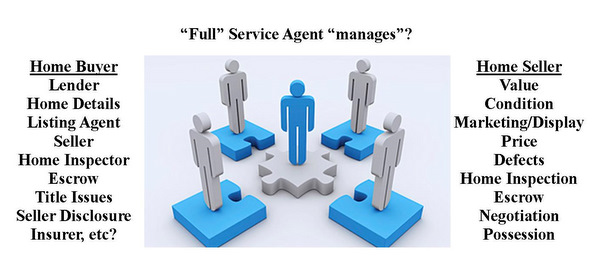Do you WANT a “full service” real estate agent?
Many will say “NO, I don’t want my agent 2nd guessing ME!” Then don’t pay the price for one. Don’t hire one in the first place. Instead, find a lower cost “service provider” who would not presume “to tell YOU, the customer, that you are wrong”. Hire “less for less”.
But if you want someone 2nd guessing you, every step of the way from start to finish, so that you do not make even a tiny mis-step, without knowing it, when buying or selling something that costs hundreds of thousands of dollars…then you may not want to save those dollars by choosing “less for less”.
The reason we need many and varied “models” in real estate, more than are currently available, is because not everyone wants or needs a “full service” agent. If you need “less”, then “less” is full to you! Let’s explore the “full service” model so that you know when “full” is paying too much for what you may need.
The key is knowing which model suits YOUR needs best.

The FULL service agent is represented by the blue person in the middle
who is managing and 2nd guessing ALL of the people
who will be involved on your behalf.
ONE of those people is YOU!
A “full service agent” is not a service provider who is giving you what you ask for and doing what you tell them to do. A “full service agent” is helping you get the right answers to the RIGHT questions…not merely those you happen to ask.
A “full service agent” also does not fully delegate the other services like lender and escrow and home inspector and does not keep their nose out of those valued roles in the transaction.
A “full service agent” does not merely help you buy a house that is for sale. A “full service agent” tells you when all of the best houses have just been sold off, and you are picking from an inadequate selection, and should wait for the next better home to come on market.
If you go to the market an hour before the next bread shipment comes in, and the only bread on the shelf is day old bread, do you buy that bread? No! You ask when the next shipment of bread is coming, and if they say in 20 minutes..you do the rest of your shopping and come back to the bread aisle when the fresh bread is available. When you choose from only those that happen to be “for sale” at the time you are looking, you are not doing “it” right. You may be buying “the day old bread” at a GREAT price!
You should not be looking at homes with your agent to pick one to buy.
You should be looking at homes with your agent to determine what it is,
that may not be for sale today,
that you should buy.
IF you are looking for a hot commodity…one that the majority of home buyers want…then the one you are standing in with your agent is NOT likely “it”.
The odds are not in favor of it being for sale…and OMG! no one else found it in 72 days.
Let’s get the wrong “it” for less, because it is stale on market, is NOT how you buy a home for your family
to live in for 10 years or more.
Homes value on a relative basis. YES you can pick a lesser location or lower valued home style and pretty much anything you want. BUT a full service agent will make you think VERY HARD about your choices, and how they will impact you on resale…some day…in the future. A full service agent will tell you what price that “what you want” SHOULD BE…not what price you can get it for based on negotiations with the seller.
If the Seller is asking $700,000 and the “fair” price for that is $550,000, you need to know that. That is not a ludicrous example…I just ran into that the other day with a client. Do you want an agent who tells you that you can get it for $650,000 if it is only worth $550,000? Will you feel great that you saved $50,000…but paid $100,000 too much?
Most importantly…will you resent the fact that the agent pointed out it is only worth $550,000?
Will you hate the agent who is giving you a headache by forcing you to see all of the important things you need to consider before spending hundreds of thousands of dollars?
The NUMBER ONE feature of a lower cost service
that says they are FULL service…
is they do not 2nd guess YOU…the client.
Examples:
1) Seller wants to price his house at $700,000. There is no way a buyer should pay more than $550,000 for it. $500,000 would be a screaming deal for a buyer. Anything OVER $550,000 would be great for the seller.
A FULL service agent will help the seller do what it will take to get $575,000 or $585,000 before it is listed for sale, and price it at $599,950.
A “service provider” will list it at whatever the seller wants to list it for and stick a sign out front and a lockbox on the door…and charge LESS for that and CALL IT FULL SERVICE for less. What it IS is “less for less”.
2) Future home buyer wants what 65% of all home buyers want. A new(er) home (or older one that needs NO repairs or upgrades) in the BEST schools in a quiet location that is near parks, playgrounds, stores and work…AND he wants it for $100,000 LESS than what it costs to get one of those. (Pretty standard scenario, BTW.)
A FULL service agent will show the buyer where they can shave off that $100,000 by compromising on the “correctable” deficiencies vs the NOT correctable deficiencies. OR, at mininum, HIGHLIGHT the deficiencies that come with that $100,000 “less” price. Often the buyer will put their head in the sand as to the weaknesses that cause the price to be $100,000 less than it should be. Some buyers want the agent to not mention those deficiencies. They want to pretend they don’t exist. A FULL service agent will make sure they are buying with “informed consent” regarding those deficiencies.
A “service provider” will help them buy the home they want and say “who am I do say “that” is a “deficiency”. If the buyer likes it…and is willing to pay for it…a “service privider” is there to help them get what they want. If they are happier not knowing…then it is the “service provider’s job” to make them happy and not point out the negatives. If the husband knows about the deficiency, but says “don’t let the wife know about that”…then that is the “instruction” a “service provider” will follow. That is “LESS for less.”
When is “less for less” FULL to you?
1) IF you don’t want your “agent” to 2nd guess YOU…less is FULL.
2) If you don’t want your agent treating both spouses as equal clients. If you want to keep things from “The Mrs.” because she over-reacts to negatives…less is FULL.
3) If you don’t want an Agent telling you that you are asking TOO MUCH for your home, or telling you what you need to DO to the house to maybe make it worth THAT much by creating a lot of “extra” work…less is FULL.
4) If you want your Agent to do what you say…
never tell you that you are wrong…
even when you are wrong…
less is FULL.
Do YOU want a “full service” real estate agent?
There is no ONE “right” answer to that question.

 The Washer, Dryer and Refrigerator are generally NOT Real Estate items that go with a house. They are considered to be Personal Property. That is why sometimes you will see a spot where these things go…but no appliance there. That will pretty much NEVER happen with a stove or oven or dishwasher.
The Washer, Dryer and Refrigerator are generally NOT Real Estate items that go with a house. They are considered to be Personal Property. That is why sometimes you will see a spot where these things go…but no appliance there. That will pretty much NEVER happen with a stove or oven or dishwasher. Lots of people want a NEW Construction home, the same way they want a new car vs a used car. However starting the home buying process at “I want NEW” is just as wrong as starting the home buying process at “I want a foreclosure”.
Lots of people want a NEW Construction home, the same way they want a new car vs a used car. However starting the home buying process at “I want NEW” is just as wrong as starting the home buying process at “I want a foreclosure”.